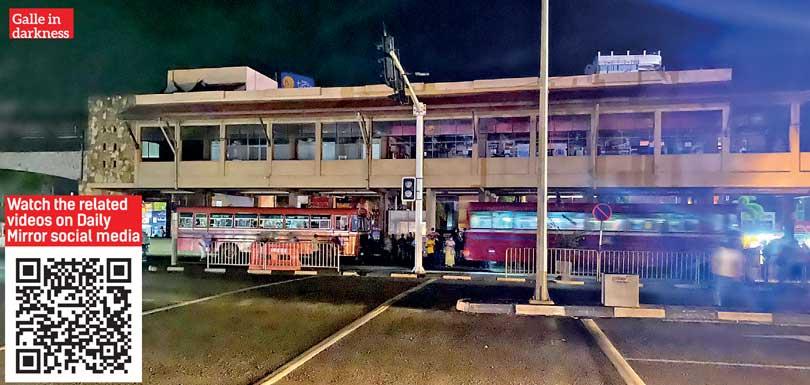
- Hotels run dry as tourism takes a hit
- Traders in dire straits
- Fishermen suffer without fuel
- Tuk Tuk drivers lose income
- Australian cricketers bring temporary respite
12 July 2022
 Usually flowing with tourists, Galle has now turned into a virtual ghost town as a result of the economic crisis. A team from the Daily Mirror visited the Galle town recently and Unawatuna as part of its ‘Gamin Gamata’ segment to see first-hand the issues faced by the public. Most locals are travelling to Galle from other parts of the country by train or bus instead of using their own vehicles owing to the fuel crisis. Trains operate between Galle and Colombo daily while luxury buses operate every hour from Makumbura and Maharagama to Galle town.
Usually flowing with tourists, Galle has now turned into a virtual ghost town as a result of the economic crisis. A team from the Daily Mirror visited the Galle town recently and Unawatuna as part of its ‘Gamin Gamata’ segment to see first-hand the issues faced by the public. Most locals are travelling to Galle from other parts of the country by train or bus instead of using their own vehicles owing to the fuel crisis. Trains operate between Galle and Colombo daily while luxury buses operate every hour from Makumbura and Maharagama to Galle town.
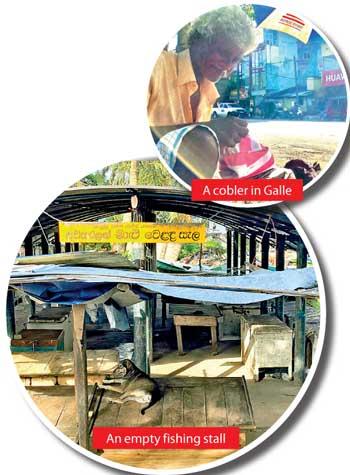 While travelling by train or in a luxury bus is an experience for many, the experience ends when arriving in Galle town.
While travelling by train or in a luxury bus is an experience for many, the experience ends when arriving in Galle town.
Visitors are often stranded at the Galle Railway Station or Galle bus stop as there are little or no tuk tuks to take them to their next destination.
Of the few tuk tuk taxis that are operating in Galle, most charge extra and have their meters switched off.
“We have no choice, but to charge extra considering the limited fuel we have and the days we spend in a fuel queue,” one three-wheel driver said.
The long wait
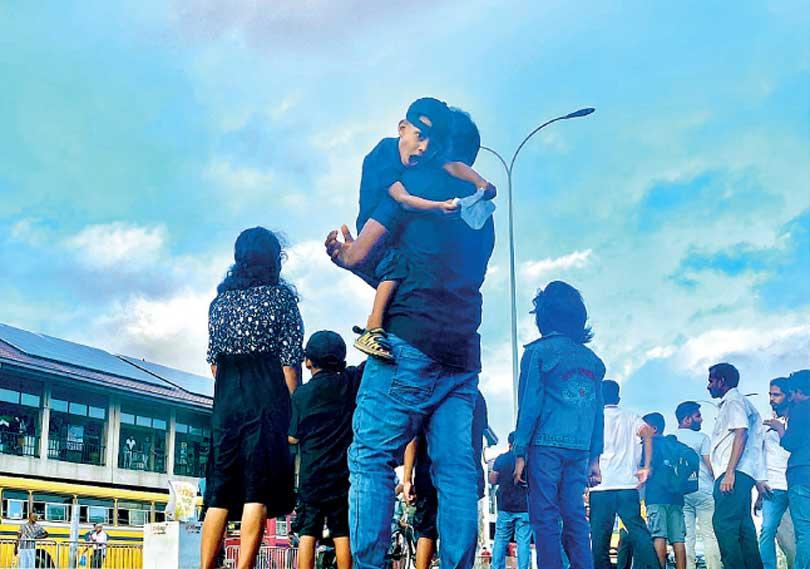
A man comforts his child at a protest in Galle
Long queues can be seen at fuel stations in Galle like in any other part of the country. The majority of the vehicles at these fuel queues are tuk tuks.
“We have been waiting in this queue for about 3 days. We still don’t know when we would get petrol,” a tuk tuk driver standing near a fuel station along the road connecting to the Galle entrance of the Southern Expressway said.
The driver said that the biggest issue is that the fuel stations are unaware when fuel would arrive hence the public are also inconvenienced.
“If we are given a date and a time then we don’t have to wait here day and night,” the three-wheel driver said.
He said that the failure to properly manage the crisis has led to people venting their anger at the Government and the authorities and also the clashes that have erupted among the public.
“We are also seeing social issues taking place with people turning to drugs and drinking a lot to ease mental stress,” the tuk tuk driver added.
Another tuk tuk driver said that he misses his family because most of his time is spent in the fuel queues.
“My family keeps calling me and asking me when I am returning home,” he said.
Another person in the queue said that he had borrowed money to pump fuel for his son’s motorcycle.
He said that by waiting in the queue for days apart of the money he had borrowed has been used to buy food.
“I will be forced to go home without fuel. My son will then ask me to show the fuel I purchased,” the man said.
The gas cylinder queue
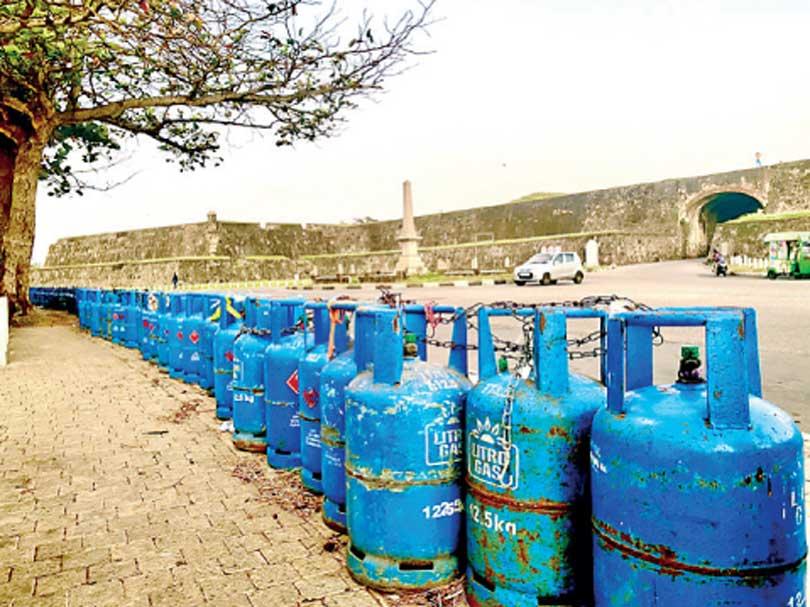
Gas cylinders have been lined up near the Galle
Cricket Stadium
As you enter the Galle town a sight that captures your attention near the Galle Fort is a line of empty gas cylinders placed around the Galle cricket stadium.
The blue cylinders have been chained together and placed as a mark of protest; a demand for cooking gas.
A woman who arrived in a car and started counting her cylinders placed around the cricket stadium said that she had placed 10 empty cylinders.
Her gas cylinders are chained together and marked, yet she says there have been incidents where some cylinders were stolen at night.
Another individual, Devananda, said that he has 4 gas cylinders placed around the stadium.
The cylinders include that of his immediate family members and one owned by a policeman. “These cylinders have been here for over 31 days. I come on a bicycle daily and go back. The authorities keep telling us that we will get gas in 4 days or 5 days, but nothing happens,” he protested.
Devananda also pointed at a tuk tuk which had been parked near the gas cylinders for nearly 30 days after running out of petrol.
“There is a woman in the tuk tuk and she eats and sleeps in it. This is the pathetic situation we are facing,” he said.
Devananda said that he comes to inspect his cylinders daily as there have been incidents where some cylinders had been stolen.
As a result a small tent has now been placed for a man to stay overnight and guard the cylinders.
“There were yellow cylinders here as well, but just a day before the 1st Test match between Sri Lanka and Australia began at the Galle stadium, a truck came and sold Laugfs Gas. So now it’s only the Litro gas cylinders that are left,” the man guarding the gas cylinder said.
Small businessmen hit
Small businesses in the Galle area have also been hit by the economic crisis with little or no tourists and even area residents cutting down on their expenditure.
A woman selling vegetables on the streets said that she has not had sufficient business for the past 2-3 months.
She said that she spends her money to buy vegetables from the village and comes to the city to sell them.
However, she says she is unable to sell even 5 out of the 10 vegetables she buys.
“There is a drop in the number of people frequenting Galle town. So sometimes I need to wait for 2 days to sell what I could usually sell in a day,” she said.
The woman went on to say that her daily earnings are insufficient to sustain her daily needs as she is not making profits.
A man selling savouries along the streets of Galle said that he has also lost much business because of the economic crisis.
He said that he has also raised the prices of his items as he is unable to make even a small profit by selling them at the old price.
“I have raised the price of a vadai and other food items sold at my mobile stall,” he said.
The trader said that the public keep asking him why the food is so expensive, but he says with the rising costs- including that of fuel- he is unable to maintain the prices at the old rate.
“With this crisis there are only about 30 percent of people coming to buy stuff from me. We don’t have any tourists even to buy from us,” he added.
A rambutan seller said that his business had also taken a beating as a result of the economic crisis.
He said that very few people spend money to buy rambutan despite it being the rambutan season. A cobbler seated within Galle town said that very few people come to him these days to get shoes or umbrellas fixed.
“Most people don’t have the money now or the time as most of their time and
money is spent at the fuel queue,” he said.
The cobbler said that he has also raised his prices as the price of thread, gum and rubber had increased.
“What was Rs. 150 earlier is now Rs. 500. What was Rs. 200 earlier is now Rs. 600,” he said.
He has been doing this job for 15 years and says he will continue as long as he has the strength as there is nothing else he can take to.
Galle is also dependent on its fishing community, but given the fuel crisis even fishermen find it difficult to go to sea.
And those who manage to catch fish say they are unable to sell most of their catch.
Deserted beaches
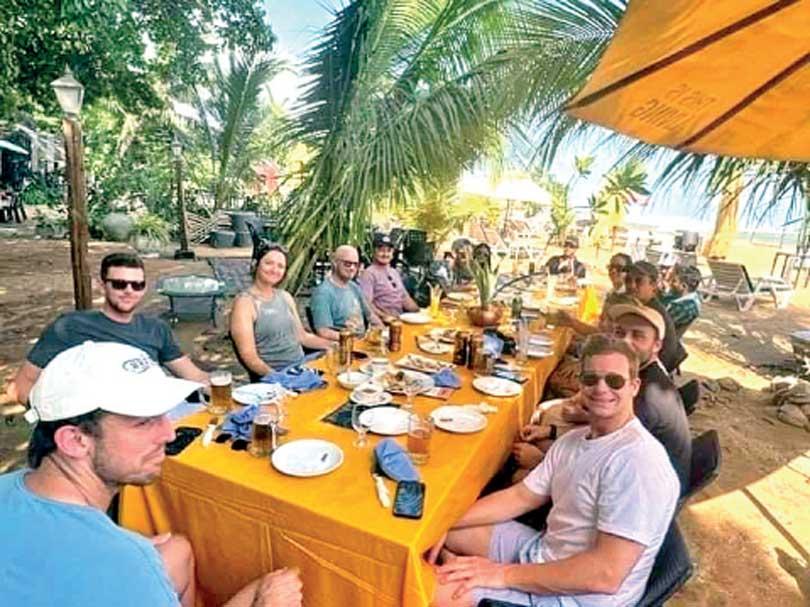
Foreign tourists in Galle
On a normal day Galle, a place especially like Unawatuna is full of tourists. However, today, even the beaches are deserted.
Deserted beaches have affected small restaurants along the Unawatuna beach and small shops in the area.
“There are no tourists now. This area is now virtually deserted. Shops and restaurants are closed and people here are suffering,” a resident of Unawatuna said.
Dayawathi and her daughter have been selling textiles and other items in Unawatuna for over 15 years.
However, the economic crisis has put the future of their business at risk.
Dayawathi said that she and her daughter did not depend on anyone and could manage on their own.
However, today, things have changed.
Dayawathi gets textiles and other goods from suppliers and sells them for a
small profit.
With little or no tourists visiting the area Dayawathi says that most of the goods are gathering dust.
“Our daily income earlier was around Rs. 5000 to Rs. 10,000 but now it is zero,” Dayawathi said.
Her daughter was employed at a private company, but she left her job to help
her mother.
Dayawathi and her daughter said that they try to manage with what they are left with and keep the shop closed on most days as they have no customers.
A tuk tuk driver who usually transports tourists near the Unawatuna beach said that he too is experiencing a huge loss.
He urged the authorities to put forward a permanent solution to the crisis and help the public get back on their feet.
Australians bring temporary relief
The ‘Gamin Gamata’ team visited Galle at a time the Australian cricket team was in the area to play a Test cricket series.
The visit by the Australian team brought temporary relief to the people in the area.
Several people travelled to Galle from Colombo and other parts of the country to watch the Test match.
This helped the local economy to some extent with people arriving in the area and spending on food and accommodation.
Also visiting Galle with the Australian cricket team are Australian cricket fans.
One Australian fan told the ‘Gamin Gamata’ team that he hopes more tourists would visit Sri Lanka and help the country recover economically.
Meanwhile, the Australian cricket team also went around after the match; visiting restaurants in Unawatuna for a meal.
Traders in Galle said that they are grateful to the Australian cricket team for visiting the country at this critical time.

No comments:
Post a Comment
Note: only a member of this blog may post a comment.